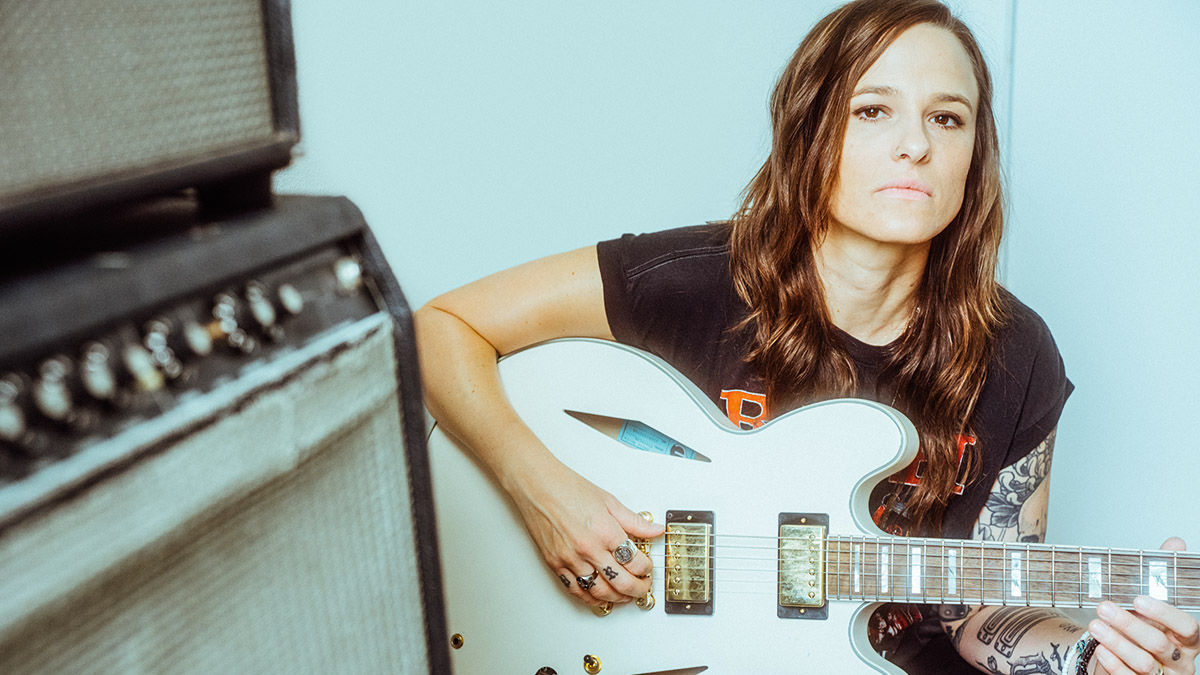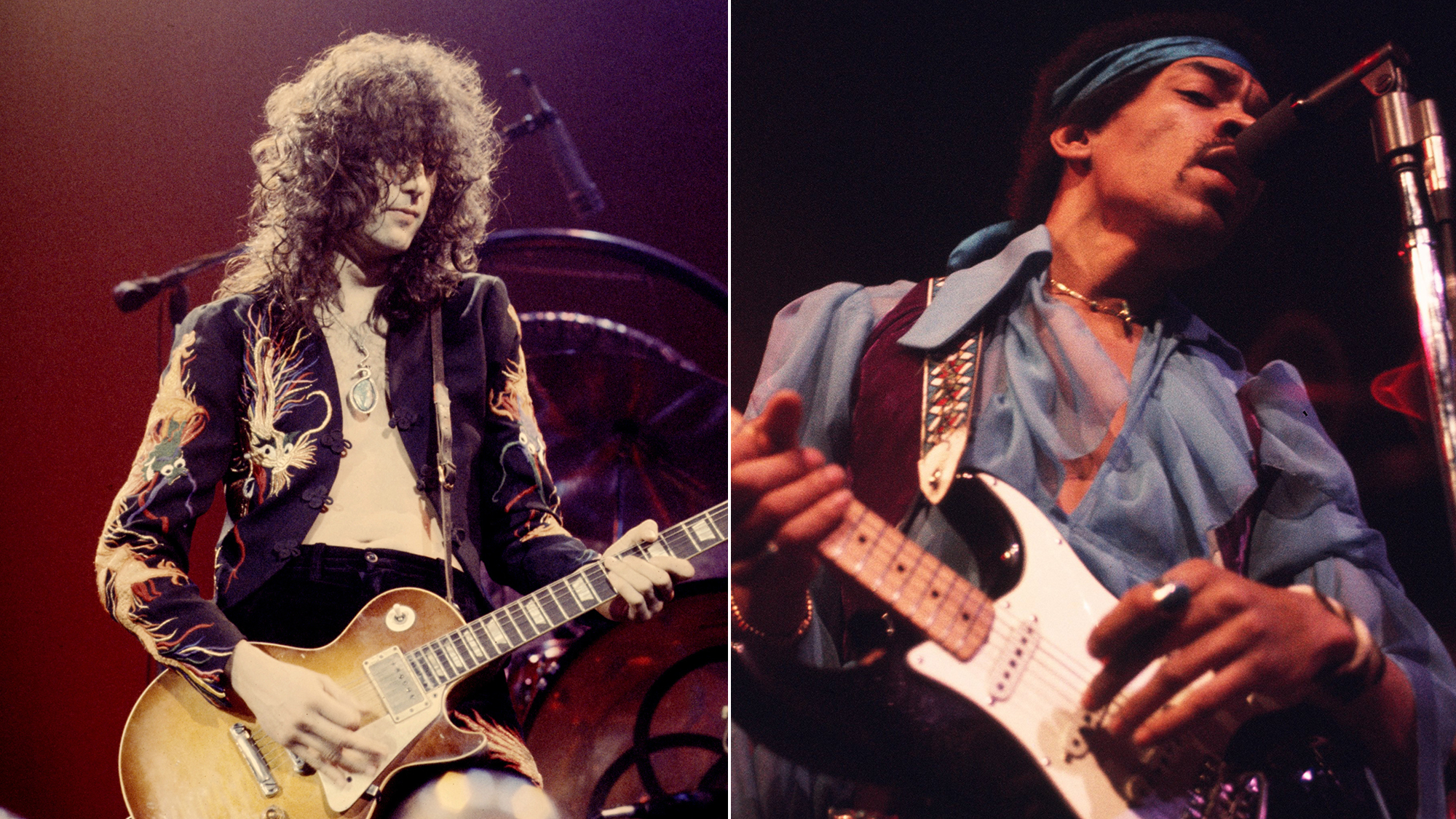“It was so fun to learn how to play the doubleneck – there’s so many switches and knobs that it was essentially like learning another instrument”: Emily Wolfe is expanding her guitar arsenal – and processing rage through gnarly tones
The Epiphone signature artist isn't missing any targets on new album The Blowback, turning up the fury with a jerry-rigged DIY guitar sound that's set to blow

Catalysed by the plethora of regressive legal changes that have rocked the United States in recent years, Emily Wolfe is back with her third studio album – and this time, she’s pissed off. “It’s an intense record,” she tells Total Guitar, speaking from the room where she harnessed a storm of emotions into the 10-track explosion that is The Blowback.
Reeling from the reversal of Roe v. Wade, the experience of protesting anti-trans/anti-LGBTQ+ legislation in her home state of Texas and learning to process deep personal trauma, Emily has delivered an album with the potential to resonate with the lived experiences of millions.
“I wanted to write something that I felt would help not just myself heal from the insanity of the world right now,” she says, “but hopefully other people, too…”
Whereas her 2021 album Outlier was boppy and stacked with love songs, the new record has rage in its bones.
Writing from a “dark headspace”, she recalls getting inspired by “dissonant rock” and live recordings of Veruca Salt from back in the ’90s. “They were channelling the exact emotions I was feeling,” she says. “That allowed me to tap into the punk side of myself, where it’s middle fingers to all of it!”
But, to maximise the chances of the record’s all-important messaging sticking in people’s minds, she also doubled down on catchiness, embedding earworm melodies and singable guitar hooks within heavy-hitter tracks like Walk In My Shoes and Silencer.
“If I can force a melody to stick in somebody’s head, maybe they’ll listen a little bit closer,’ she reasons, recognising that the subliminal approach is often the most effective. “I wanted to steer people’s brains into a certain direction, where they felt empowered to feel their own emotions and fight back.”
Get The Pick Newsletter
All the latest guitar news, interviews, lessons, reviews, deals and more, direct to your inbox!
Emily’s main weapons in this fight come in the form of her signature Epiphone Sheraton hollowbody guitars. She relied on her original black Stealth model for much of the album, calling upon the prototype of its pale twin, the White Wolfe, for the “heavier, drop C stuff”.
Identically spec’d with gold Epiphone Alnico Classic Pro humbuckers, their tones are meaty and substantial by default, so Emily also mixed in the “thinner sound” of a couple of Telecasters for contrast.
Her newest acquisition is an Epiphone G-1275 Custom doubleneck. Also finished in white and fitted with gold hardware, it matches the White Wolfe’s aesthetic to a tee. Physically, however, it’s an altogether different beast, offering 12- and six-string configurations on one super-sized SG-style body.
“It was so fun to learn how to play that thing,” she says. “There’s so many switches and knobs that it was essentially like learning another instrument because it’s double the guitar. It’s heavy, it’s big and I love playing it,” she adds – joking that she’ll deal with the inevitable back pain once her current tour is over.
To get the most out of the instrument, she tunes the six-string half down to drop C and leaves the 12-string half in standard tuning, using 0.009-gauge electric guitar strings to make soloing manageable. “It’s real hard to solo on a 12-string if it’s got 0.010s or 0.011s on it,” she warns. “But I do a lot of solos on the 12-string and it’s a fun challenge.”

On the subject of fun challenges, Emily also took full control of production for the first time on The Blowback, bringing her vision for the project to life with veteran levels of confidence, as well as some slightly off-kilter gear experiments.
For many musicians, the joy of entering a studio will be getting the chance to use high spec, well maintained equipment. But Emily believes there is just as much joy to be found in wonky old gear that would be regarded by most as unfit for purpose.
“Something I didn’t really get to try in my past two records was using broken equipment and I love broken electronics,” she beams. “I ended up using a lot of things as guitar pedals that were not intended to be used as guitar pedals.”
One such example involved finding a way to utilise a slightly knackered Marantz CD Recorder from the early 2000s as a preamp.
“It’s got two inputs for a mic and some outputs so you can basically record your own CD, and it’s not a good piece of equipment by any means,” she smiles, relishing the DIY nature of the whole experiment, which involved connecting the device to her Fender Vibro Champ for a “bizarre” and intriguing guitar tone.
Next up, “to catch feedback from different angles”, she gaffa-taped an SM57 to a remote control car, stationed herself in the console room and drove it around the tracking room while her guitar and amp howled away in an ear-splitting feedback loop. You’ll hear the multi-dimensioned noise fest just before the solo hits on Dead End Luck, and it is glorious.
“It was just so fun because there were no babysitters,” she says. “There was nobody telling me, ‘We don’t have time.’ Or, ‘This isn’t going to work.’ I got to do whatever I wanted and it was awesome.”
The proud owner of a whopping pedal collection, Emily also used lots of actual guitar gear, with the album’s cornerstone tones coming from her EarthQuaker Devices Dirt Transmitter Fuzz and Dunes Mini Mega Ultimate Overdrive pedals, as well as an ’80s Tube Screamer, an Analog Man King of Tone and an assortment of “Big Muff copies”.
As she says: “It’s interesting because there are some producers out there who are not that into pedals. But that’s my shit. I love pedals! When I found a pedal that I really loved, I would EQ it differently so that one side of my ears would have the mids up high and the other would have the opposite. Each ear has a different tone and it ends up being a really interesting sound.”
She also made use of an Eventide rack unit at the studio that had previously been used by David Bowie’s producer Tony Visconti. He’d left behind a shimmer reverb setting, and having initially wanted Visconti to produce her album, Emily considered it fate and incorporated the tone into the mix.
Comparing the overall feel of The Blowback to Outlier, she counts three major points of difference: “There’s less synth, more guitar and a lot of anger!” Said anger carried through into the physicality of her playing. She found herself grinding out harsher rhythms than ever, attacking the strings as if her pick were a weapon.
“There’s a song called Predator that I wrote from a guitar rhythm when I was so angry about a certain situation,” she says. “I picked up this Epiphone Wilshire – which feels kind of like a toy because it’s real small, but it’s got P-90s and is really ratty-sounding – and played this rhythm. I dug in a lot and I didn’t apologise for it! I was like, ‘Fuck it, I’m gonna rip so hard!’ and it was really healing.”
If this record makes anything clear, it’s that Emily Wolfe is done with playing nice. “I grew up in an environment where pleasing everybody around me was the priority, and I’d put my own feelings on the backburner,” she explains, astutely putting her finger on the unspoken code of conduct that many young artists – particularly female ones – find themselves adhering to when trying to find their place in the industry.
“I finally just stepped into my own power with this record,” she smiles. “It’s more than songs to me; it’s a new phase of my life and my emotional wellbeing and I hope it empowers other people.”
- The Blowback is out now via Crows Feet.
Since graduating university with a degree in English, Ellie has spent the last decade working in a variety of media, marketing and live events roles. As well as being a regular contributor to GuitarWorld.com, she currently heads up the marketing team of a mid-scale venue in the south-west of England. She started dabbling with guitars around the age of seven and has been borderline obsessed ever since. She has a particular fascination with alternate tunings, is forever hunting for the perfect slide for the smaller-handed guitarist, and derives a sadistic pleasure from bothering her drummer mates with a preference for wonky time signatures.
“It was tour, tour, tour. I had this moment where I was like, ‘What do I even want out of music?’”: Yvette Young’s fretboard wizardry was a wake-up call for modern guitar playing – but with her latest pivot, she’s making music to help emo kids go to sleep
“One of the guys said, ‘Joni, there’s this weird bass player in Florida, you’d probably like him’”: How Joni Mitchell formed an unlikely partnership with Jaco Pastorius








![John Mayer and Bob Weir [left] of Dead & Company photographed against a grey background. Mayer wears a blue overshirt and has his signature Silver Sky on his shoulder. Weir wears grey and a bolo tie.](https://cdn.mos.cms.futurecdn.net/C6niSAybzVCHoYcpJ8ZZgE.jpg)

![A black-and-white action shot of Sergeant Thunderhoof perform live: [from left] Mark Sayer, Dan Flitcroft, Jim Camp and Josh Gallop](https://cdn.mos.cms.futurecdn.net/am3UhJbsxAE239XRRZ8zC8.jpg)
